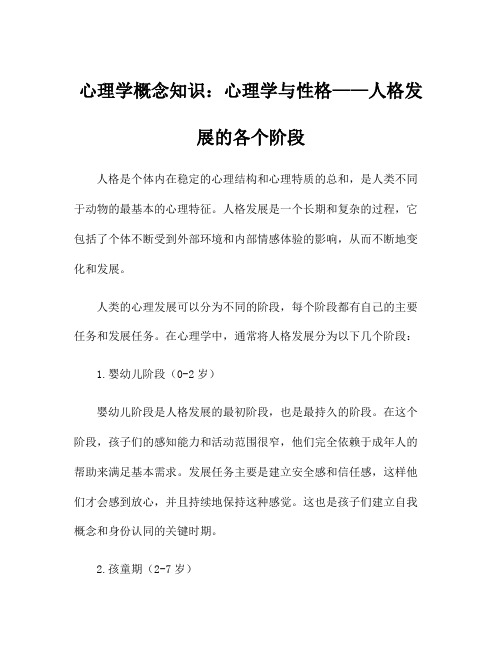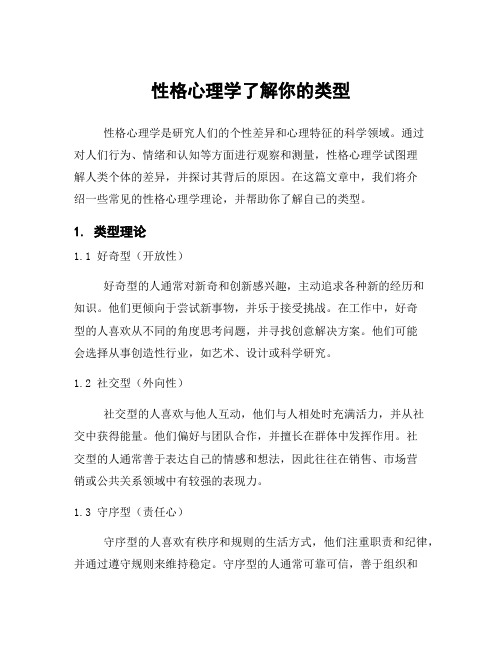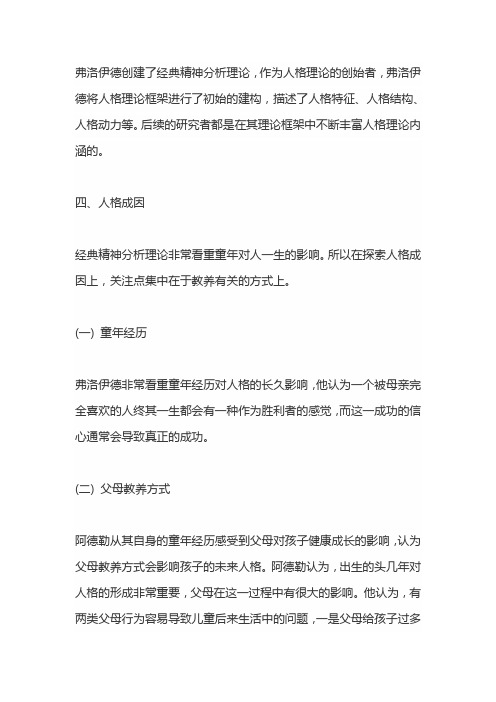性格心理学--全
性格心理学

(1). The Lexical Approach: 例:自形容人的語彙中找主要 的特質 (2). The Theoretical Approach 例:精神分析論重視自我強 度 (3). The Statistical Approach: 因素分析法
Henry Murray
【各家學說】 Person logy: Henry Murray 研究個人生活及影響其生活的因素。(Study individual "human lives and the factors that influence their course." (1938:4) Ⅰ、特色
Gordon W. Allport
1.有關特質的假設
(1).特質不僅是行為的命名(Nominal existence) ,而 且是組成個體的一部分 (2).特質普遍性較習慣高 (3).特質是動態的並影響行為 (4).特質可以實徵驗証 (5).特質間不完全獨立 (6).特質並非道德或社會判斷的同義語 (7).特質可以共通性或特徵性的方式研究 (8).與特質不一致的行為或習慣,正表示其存在
Gordon W. Allport
6. Proprium (統整) Latin Words: Proprius Means "own" 性 格的某些部分 發展歷程
Gordon W. Allport
3. Trait 分類的方式
(1).按其重要的層次分
(A).Cardinal:影響個體生活各層面的主要動機,個體每一行為皆反應 此一動機。 (B).Central Trait: 影響個體大部分行為。e.g. Hamlet的特性 Introspective, Obsessive, Melancholy, revengeful, dramatic, indecisive. (C).Secondary Trait:較受情境影響的
心理学概念知识:心理学与性格——人格发展的各个阶段

心理学概念知识:心理学与性格——人格发展的各个阶段人格是个体内在稳定的心理结构和心理特质的总和,是人类不同于动物的最基本的心理特征。
人格发展是一个长期和复杂的过程,它包括了个体不断受到外部环境和内部情感体验的影响,从而不断地变化和发展。
人类的心理发展可以分为不同的阶段,每个阶段都有自己的主要任务和发展任务。
在心理学中,通常将人格发展分为以下几个阶段:1.婴幼儿阶段(0-2岁)婴幼儿阶段是人格发展的最初阶段,也是最持久的阶段。
在这个阶段,孩子们的感知能力和活动范围很窄,他们完全依赖于成年人的帮助来满足基本需求。
发展任务主要是建立安全感和信任感,这样他们才会感到放心,并且持续地保持这种感觉。
这也是孩子们建立自我概念和身份认同的关键时期。
2.孩童期(2-7岁)随着孩子逐渐开始独立探索自己周围的世界,在这个阶段,孩子们会开始发展自己的想法和意见,他们会不断地学习和发现新事物。
发展任务是建立自强和探索能力,发展独立思考和解决问题的能力。
同时,孩子们也要学会管理自己的情绪,理解相关的文化规范和价值观,以及建立社交技能。
3.少年期(7-12岁)对于儿童来说,青春期是一个激动人心和充满挑战的时期。
在这个时期,孩子们已经有了自己的独立思考能力,并且意识到自己是独立的个体,开始建立自己在社会中的角色和身份。
发展任务主要是建立清晰的自我概念和自我感觉,这可以通过私人体验、社交交往和自我评价等方式来完成。
青年期对于孩子们来说,是一个个性化和自我发展的重要时期。
4.青少年期(12-18岁)在青少年期,个体的身份认同和自我概念已经相对成熟,个体也开始建立自己的生活目标和价值观。
在这个时期,个体的心理发展主要是建立更强烈的自我概念和自我意识,这可以通过探索自我和他人之间的关系、学习各种社会角色和职责、建立自我价值和意义等方式来完成。
5.成年期(18岁以及以后)成年人是一种相对成熟的人格状态,他们已经有了比较稳定的自我概念和价值观,并建立了稳定的身份认知。
人格心理学(完整)

人格心理学一、什么是人格理论人格理论是一套正规的符号系统,用来组织人格研究材料,解释和说明人格、人性、人格结构、人格发展动力、条件以及阶段性等理论问题,以反映人格心理现象的本质与规律,并提出可验证的理论假设和启发人格研究的新观点、新方法。
人格:是个体在先天生物遗传素质的基础上,通过与后天社会环境的相互作用而形成的相对稳定而独特的心理行为模式。
二、人格研究的主要途径(一)临床研究1.临床研究也称个案研究,指对个体作系统的深度的考查。
源于沙可对病人的诊断和治疗(催眠术)2.代表:弗洛伊德(精神分析)、默瑞(主题统觉测验)罗杰斯(人类潜能运动)、凯利(构念、建构)3.评价优点:提供了一个机会使我们可以了解到一个活生生个体的心理与行为活动,获得大量有关的信息资料,由此能形成无数新的假设和观察缺点:(1)以特殊个体为研究对象,难以引出普遍性的结论,容易发生以偏概全的错误(2)缺乏客观性,结果很难让别人重复和验证(二)相关研究1.涵义:使用统计测量来建立个体间已存在的差异的那些测量集之间的联系或相关性2.代表高尔顿(个体差异、测量和遗传)卡特尔(把人格单元或特质作类型划分)艾森克(通过对问卷项目的反应进行因素分析)3.评价优点:(1)容易操作,省时,短时间可获得大量数据(2)符合研究对象的自然形态和实际情况,减少人为性(3)可以研究一些实验法不能研究的问题。
缺点:不能确定因果关系(三)实验研究1.涵义:对变量作系统的操作以建立起因果关系2.代表冯特(自然科学的实验研究)艾宾浩斯(遗忘与时间的函数关系)巴甫洛夫(经典条件反射)华生(刺激与反应的联系)斯金纳(操作条件反射)3.评价优点:实验取向在很多方面代表了科学思想,因果关系缺点:实验情境的局限性(避免不了人为性)人格元素之间纷繁关系研究上的局限(四)综合取向实例:1.A型行为模式临床发现-(结构访谈)问卷测量-实验验证启示:共同的科学目标,不同的研究途径第二章古典精神分析一、人格结构1、意识:可觉察的心理活动,只占很小的部分,弗洛伊德不予重视。
心理学--性格

第十一章性格第一节性格的概述第二节性格类型与评定第三节性格的形成与发展阜阳师范学院心理学教研室制作第一节性格的概述一、性格的概述:㈠什么是性格:人对现实的稳定态度和习惯化了的行为方式中所表现出的个性心理特征。
⒈一个人作为社会成员,生活在集体中,处于各种社会关系的影响下,每个人都意识到社会现实给予他的影响,并对这种影响有其特定的应答活动。
⒉性格是是个性中具有核心意义的部分。
⒊人的性格是后天获得的,是现实社会关系在人脑中的反映。
⒋人的性格是在长期生活环境和社会实践中逐渐形成的。
二、性格与气质:㈠性格与气质的差别:⒈性格的社会性较强,气质生物性较强;⒉生理基础不同:性格是后天条件反射系统,气质是先天神经类型;⒊性格形成晚且较易变;气质形成早且不易变㈡性格与气质的联系:⒈性格在一定程度上掩盖或改造气质。
⒉气质影响性格的形成父母对儿童的期望通过教育教养方式影响儿童的性格形成,同时,婴儿早期形成的气质特点必然会影响和修正父母的教养方式和态度。
⒊气质影响到个体对事物的态度和行为方式气质可以按照自己的动力方式,渲染性格特征,从而使性格特点具有独特的特点。
⒋气质影响性格的形成和改造的速度例如,要形成自制力,粘液质和抑郁质比较容易,而胆汁质和多血质相对困难。
三、性格与能力性格与能力既有区别,又存在着密切联系、相互制约的关系。
首先,能力的形成和发展受性格特征的制约。
优良的性格特征和品质能有效地促进能力的形成和发展。
其次,能力的形成过程本身也能够促使相应的性格特征得到发展。
四、第三性征心理学把男女性格和行为上的心理特征叫作第三性征,或者称为性度。
即心理上的性别差异。
心理学的性度概念,抛开人的男女生理差异,只依据体制、行为表现和能力来区分男性型和女性型。
第一性征:男女两性由生殖器构造特征决定的性别差异。
第二性征:男女两性由于激素分泌在外形上表现出来的性别差异。
第三性征的女性型特征是清秀、苗条、温柔等,男性则是刚强、暴躁、粗喉大嗓等。
心理学--性格(Psychology--character)

心理学--性格(Psychology -- character)Psychological termsCharacter is the personality characteristics of a person in the stable attitude of the reality and habits of behavior, it shows a person's moral character, by people's values, outlook on life, world view influence. These personality differences with moral evaluation, we call personality differences. Character is gradually formed in the social environment of the day after tomorrow, and it is the core personality difference of people. Character is good or bad, can directly reflect a person's moral style. Personality is gradually formed in the social life, but also by the difference of individual biological factors influence the nature and character of the character is acquired form, such as shyness, irritable personality, decisive character and irresolute and hesitant character. Nature is a way of thinking that human beings are born with and cannot be changed. Nature is innate, such as self-esteem, vanity, honor, etc.. Human nature consists of the nature of survival, the nature of laziness and the nature of being unhappy._________________________________________________________________________________________________________________________________Six classificationsReality typeRealistic people like outdoor, mechanical and sports activities or occupations. I like to deal with things, but Idon't like to deal with people. I like to make things and fix things. I like operating equipment and machines, and I like to see tangible things. Perseverance, diligence, lack of creativity and originality. I like to do things in a familiar way and build a fixed pattern, and I think the problem is often absolute. I don't like ambiguity, I don't like abstract theory and philosophical thinking. It's a traditional, conservative person with a lack of good interpersonal skills and verbal communication skills. When you become the center of attention, you feel uncomfortable and not good at expressing your emotions. Others think he is shy and shy, but the vast majority of realists are adhering to the realistic life and work style.Exploratory typeInquisitive people are inquisitive and inquisitive. Like to understand, explain and predict what's going on around you. Passion for scientific exploration. For non science, too simple or supernatural interpretation, more negative and critical attitude. Love to do can be absorbed in, intentnesses. Being independent and loving doing things alone. I don't like managing people and I don't like being controlled. I like to look at problems from a theoretical and speculative point of view. He likes to solve abstract and ambiguous questions, creative, fresh and creative, and often difficult to accept traditional values. Escape from a highly structured and bound environment. Deal with things step by step, precise and methodical, confident in your own intelligence. Embarrassed in social situations, lack of leadership and persuasion skills. In interpersonal relations, stiff and rigid. Not good at expressing emotions, may give people a feeling of not friendly,exploration should pay more attention to their own development and innovation spirit.Art typeArtistic people are creative, expressive, principled, naive, and individual. Love is out of the ordinary try to be a man of great transcendence. I don't like to engage in heavy physical activity, and I don't like highly standardized and programmed tasks. Like to express things through art works,self-expression, hope to get public attention and admiration, very sensitive to criticism. In clothing, behavior, tend to unrestrained, not follow the tradition. Like to work in the absence of supervision, work more impulsive. Great attention to beauty and aesthetic taste, more emotional and complex thinking of the heart. I like abstract work and unstructured environments. Seek acceptance and praise from others, and feel intimate relationships are stressed and avoided. Mainly through the art of indirect communication with others to make up for alienation, often self thinking, thinking unrestrained, unrestrained, with a strong divergent thinking.Social typeSocial people are friendly, enthusiastic, outgoing and cooperative. Good at communication, like to associate with people.Be sensitive to other people's emotions and problems. Like to play the role of helping others, such as teachers, consultants, civil servants. Like to express yourself and be persuasive inthe crowd, like being the focal point and being happy in the center of the group. Sensitive to life and being with others, idealistic and cautious. Like philosophical issues, such as life, religion and moral issues. Do not like to engage in machine or data related work, or the structure of the tight, repetitive work. Getting along well with others, expressing emotions naturally, treating people with tact, giving others the impression of kindness and willingness to help others, if they can be recognized by the society, will make great contributions to the country.Management typeManagement oriented people are extroverted, introspective, persuasive and optimistic. Love is courage, daring. Highly motivated and interested in management and leadership. Usually like to pursue power, wealth, status. Being good at words, he always tries to make others accept his own opinions, and he has the ability to persuade and deploy people. I think I'm very popular with others, and I don't have the patience to do meticulous work. They don't like jobs that require long-term intellectual activity, and management people have clear heads and quick thinking. It is the guarantee of a reliable life and society.Conventional typeNormal people do every rhythm and stubborn and down-to-earth, love do comply with fixed copy and calculation procedure, is a reliable, efficient and conscientious person. Relying on groups and organizations to achieve a sense of security andstrive to become good members, in large institutions engaged in general work satisfied, not seeking leadership positions. When you know what you're going to do, you feel comfortable. Not accustomed to their own judgments and decisions on things, and therefore do not like ambiguous instructions, want to know exactly what they want to do, for the specified tasks can be completed well. Tend to be conservative and adhere to tradition, used to obey, execute superior orders. Enjoy working in a pleasant indoor environment, paying attention to material comforts and possessions. Have self-control and express your feelings in moderation, avoid tense interpersonal relationships, and love natural relationships. In the familiar crowd will be comfortable. Like to plan things, do not like to break the Convention, do not like to engage in heavy physical labor, this type basically in accordance with social law life. Hollander, an American career guidance expert, thinks that everyone is a different combination of these six types, but the dominant type is different. The working environment of each profession is also composed of six different working conditions, one of which is dominant. Whether a person's career is successful, stable or desirable depends largely on the adaptation between his personality type and his working conditions.______________________________________________________________________________________________________________________________________________________Character (personality), the old called personality, has been defined as the name of individual thought, emotion, behavior and attitude, it is one of the branches of psychology, andpersonality disorder (Personality Disorders), called the old abnormal personality, but is always a monopoly in psychiatry, psychology, personality has been analysis of nerve (neuroticism), extraversion (extroversion), the heart of (conscientiousness), (agreebleness), agree with the open (openness) to five degrees (Watson, D. etal., 1994). The American Psychiatric Association is also on its diagnostic and Statistical Manual (DSM-IV) (AP personality A, 1994),The character of column divided into delusion (paranoid), schizophreniform (schizoid), split type (schizotypal), performance (histrionic), narcissistic, antisocial (narcissistic) (antisocial), edge (borderline), escape (avoidant), (dependent), and forced to rely on(obsessive-compulsive) and other ten categories, and the other list ran dark (passive-aggr-essive) for a class in the appendix (Lin Tiande, 1995). The former is a statistical classification, and the latter is a clinical classification. The connection between the two is still unknown. To solve the above problems, we must first make a statistical treatment of clinical classification. Psychiatry is defined as symptoms of personality disorders, for example, there are seven symptoms of delusional personality, as long as individuals have four of them, you may suffer from this disease. It is the first purport of this study that these symptoms can be combined in such a way. The above character in in the past can be divided into three categories: the first category is the delusion, split, and split type three personality disorder, the symptoms of second is antisocial, strange and eccentric; edge, acting, and narcissism four, the symptoms of dramatic; the third is to escape, dependence, force, and the dark hit four run, thesymptom with deep concern. However, whether the clinical classification can stand the test of empirical research is questionable.Attitudinal characteristics of personalityThe attitudinal characteristics of personality refers to the general characteristics of individuals in their attitudes towards all aspects of real life.The rational character of personalityThe rational character of personality refers to the psychological characteristics of individuals in cognitive activities. In perception, in accordance with the purpose of certain tasks to observe, to active observation, some effect is obviously influenced by environmental stimuli, which belongs to the passive observation; some tend to study the details of analysis belongs to the type, some tend to observe the object contour and overall, belonging to a comprehensive; some tend to fast perception, perception is fast, some tend to accurately perceive, belongs to accurate perception. In the aspect of imagination, there are active imagination and passive imagination; there are broad imagination and narrow imagination. In memory, there are active and passive points; there are good memory and abstract memory. In thinking, there are active and passive points; independent and dependent on others of a deep and superficial classification.Emotional characteristics of personalityThe emotional characteristics of personality refers to the psychological characteristics of individuals in emotional expression. In the intensity of emotion, some emotions are strong, not easy to control; others are weak and easy to control. In terms of emotional stability, some people have high emotional volatility and emotional changes; others are emotionally stable and calm. In the aspect of emotional persistence, some people have a long duration of emotion and have a great influence on work and study; some people have short emotional duration and have little influence on work and study. In the dominant mood, some people are often full of emotions, in a happy state of mood; some people often unhappy.Volitional characteristics of personalityThe will character of personality refers to the psychological characteristics of individuals when they adjust their psychological activities. Consciousness, firmness, decisiveness, self-control and so on are the main characteristics of will. Consciousness refers to the definite purpose before action, the steps and methods of action in advance, and the overcoming of difficulties and the consistent execution in the process of action. The opposite is blind or autocratic. Firmness means that we can take some measures to overcome the difficulties so as to achieve our goals. On the contrary, firmness and vacillation are the ways of the former, and the former will not take effective methods, but they will go their own way; the latter will easily change or abandon their own plans. Decisiveness is good at distinguish between right and wrong in the complicated context, to make the right decisions quickly. Contrary to decisiveness, indecision orarbitrariness and boldness. Self control refers to being good at controlling your actions and emotions. Contrary to self control is self willed.classificationPsychologists have classified their personality types with their own criteria and principles, and here are several representative points of view:(1) from the perspective of psychological function, personality can be divided into rational, emotional and volitional;(2) from the division of mental activity tendency, personality can be divided into internal and external;(3) from the individual independence, the characters are divided into independent, obedient and rebellious(4) sprange people according to different values, the person's character is divided into theory; type, economic type, power type, social type, aesthetic, religious type.(5) Helen. According to the core value of Parma people of different values and focus and habits of different, the person's character is divided into nine types. Called the Enneagram, including: No. 1, No. 2 perfect help, No. 3, No. 4 art achievement type, 5 type, 6 type, rational doubt No. 7 and No. 8 active leaders, No. 9 peace.(6) according to people's behavior, that is, people's words and deeds and emotional expression can be divided into A personality, B personality, C personality and D personality.Allport's definition of characterCharacter Allport thinks that the term "personality" is somewhat ambiguous, because it means people's moral judgment on someone. For example, when we say that a person has a good personality, this moral judgment is included. Allport prefers: "personality is defined as the personality to be assessed, and personality is defined as a character that is not evaluated."".。
个性心理学期末复习资料(全)

名词解释:1.控制点:即一个反应会不会影响强化获得的信念。
具体来说,控制点是对个人性格特点和行为与其所经历的后果之间的关系所形成的一种概括化的期望,是人们从实际生活中积累的有关发生在自身生活里的各种因果关系的一种抽象概括。
2.智商:就是智力商数是通过一系列标准测试测量人在其年龄段的智力发展水平。
3.好奇动机:个体对新奇事物注意、探索和操弄等行为的内在动力。
4.个人潜意识:是潜意识的表层,它包括了一切被遗忘了的记忆、知觉以及被压抑的经验。
5.观察学习:是指人仅仅通过观察别人的行为就能学会某种行为的过程,又称替代学习、模仿学习。
6.模仿能力:是指仿效他人的言行举止而引起的与之相类似的行为活动的能力。
7.正诱因:当个体因趋向或接受某种刺激而得到满足的诱因。
8.集体潜意识:指在漫长的历史演化过程中,世代累积的人类祖先的经验,是人类必须对某些事件作出特定反应的先天遗传倾向。
9.类化:就是条件反射不仅能为条件刺激引起,而且也能为与条件刺激相类似的刺激所引起。
10.能力:人们成公地完成某种活动所必须具备的个性心理特征。
11.成就动机:个人追求成就的动机,是个人对自己所认为重要的或是有价值的事情,去从事、完成、追求成功并要求达到完美状态的原因。
12.根源特质:是隐藏在表面特质后面,深藏于人格结构的内层,它是制约表面特质的潜在基础和人格的基本因素。
填空1.个性心理特征主要包括:能力、气质和性格。
2.韦纳等人将个人对成就行为的归因按照内外控制和稳定性划分为4类:努力、能力、运气和任务难度。
3.4.在荣格提出的几种原型中,阿尼玛是男子个性中的女性成分。
5.多拉德和米勒认为人类行为是习得的,而不是天生的,学习需要四个因素循环往复地进行,它们是:驱力、线索、反应和强化。
6.从认识能力的角度,可以把理想分为:具体形象理想、综合形象理想和概括性理想。
7.斯腾伯格提出的智力三元理论分别是:智力的成分亚理论、智力的情境亚理论和智力的经验亚理论。
性格心理学了解你的类型

性格心理学了解你的类型性格心理学是研究人们的个性差异和心理特征的科学领域。
通过对人们行为、情绪和认知等方面进行观察和测量,性格心理学试图理解人类个体的差异,并探讨其背后的原因。
在这篇文章中,我们将介绍一些常见的性格心理学理论,并帮助你了解自己的类型。
1. 类型理论1.1 好奇型(开放性)好奇型的人通常对新奇和创新感兴趣,主动追求各种新的经历和知识。
他们更倾向于尝试新事物,并乐于接受挑战。
在工作中,好奇型的人喜欢从不同的角度思考问题,并寻找创意解决方案。
他们可能会选择从事创造性行业,如艺术、设计或科学研究。
1.2 社交型(外向性)社交型的人喜欢与他人互动,他们与人相处时充满活力,并从社交中获得能量。
他们偏好与团队合作,并擅长在群体中发挥作用。
社交型的人通常善于表达自己的情感和想法,因此往往在销售、市场营销或公共关系领域中有较强的表现力。
1.3 守序型(责任心)守序型的人喜欢有秩序和规则的生活方式,他们注重职责和纪律,并通过遵守规则来维持稳定。
守序型的人通常可靠可信,善于组织和计划,并在清晰的目标下工作效率高。
他们可能适合从事金融、法律或管理等领域。
1.4 稳健型(情绪稳定性)稳健型的人通常情绪较稳定,不易受情绪波动影响。
他们经常表现出冷静、沉着和乐观的态度,并能够适应压力和挫折。
稳健型的人在紧急情况下表现出较高的应对能力,所以在紧张环境下工作或需要处理危机的职业中可能表现出色。
1.5 保守型(恐惧程度)保守型的人对新事物持谨慎态度,更偏向于保持现状和避免不确定性。
他们喜欢稳定和安全感,并注重风险控制和安全措施。
保守型的人可能更适合在实践可行性高且稳定收益较大领域从事工作,如会计、咨询或公共服务领域。
2. 测量方法为了帮助人们了解自己的类型,研究者开发了各种测量工具来评估个体在不同性格特征上的得分。
以下是一些常见的测量方法:2.1 MBTI(Myers-Briggs Type Indicator)MBTI是最广泛使用的类型测量工具之一。
性格心理学--经典精神分析流派——“人格成因”

弗洛伊德创建了经典精神分析理论,作为人格理论的创始者,弗洛伊德将人格理论框架进行了初始的建构,描述了人格特征、人格结构、人格动力等。
后续的研究者都是在其理论框架中不断丰富人格理论内涵的。
四、人格成因经典精神分析理论非常看重童年对人一生的影响。
所以在探索人格成因上,关注点集中在于教养有关的方式上。
(一) 童年经历弗洛伊德非常看重童年经历对人格的长久影响,他认为一个被母亲完全喜欢的人终其一生都会有一种作为胜利者的感觉,而这一成功的信心通常会导致真正的成功。
(二) 父母教养方式阿德勒从其自身的童年经历感受到父母对孩子健康成长的影响,认为父母教养方式会影响孩子的未来人格。
阿德勒认为,出生的头几年对人格的形成非常重要,父母在这一过程中有很大的影响。
他认为,有两类父母行为容易导致儿童后来生活中的问题,一是父母给孩子过多的关注,造成溺爱危险,剥夺了孩子的独立性,引起更强的自卑感,会使孩子不能应对生活中的挫折和挑战,二是对孩子的过度忽视,很少受到父母关注的儿童在长大后会变得冷漠多疑,成年后,较难与别人建立亲密的个人关系。
(三)出生顺序阿德勒强调出生顺序对人格的影响,他认为,家里的头生孩子在人格上不同于中间出生的孩子,中间的孩子又不同于末生的孩子。
头生孩子会受到父母的过度注意,因此,头生孩子中常常发现“问题儿童、神经症、罪犯”等。
中间出生的孩子不会对父母的溺爱抱什么奢望,因而会形成对优越感的强烈追求,因此更有可能取得更高的成就。
对于老二来说,阿德勒的评价较为积极,认为会发展出较为强烈的寻求卓越的特性,在竞争中,向他人挑战并战胜他人的倾向会贯穿一生。
因为老二出生后就存在与老大争宠的现象,他会找出自己的发展优势,与老大抗衡,家中最小的孩子是最容易被父母纵容的,由于在家中最小,所以会被过分保护,但是,有哥哥姐姐的带领,能学会不少知识技能,因此显得更聪明。
有时候为了要和哥哥姐姐竞争,可能非常勤奋努力,表现杰出。
- 1、下载文档前请自行甄别文档内容的完整性,平台不提供额外的编辑、内容补充、找答案等附加服务。
- 2、"仅部分预览"的文档,不可在线预览部分如存在完整性等问题,可反馈申请退款(可完整预览的文档不适用该条件!)。
- 3、如文档侵犯您的权益,请联系客服反馈,我们会尽快为您处理(人工客服工作时间:9:00-18:30)。
与完美型人进行沟通的策略
1)要知道他们非常敏感和容易受伤害。 2)认识到他们天生是悲观。(他们确实可以 预见到其他性格没有注意的问题.) 3)帮助他们处理忧郁的情绪。 4)诚恳亲切地与他们沟通,并认可他们。 5)接受他们的意见。 6)接受他们有时需要安静。 8)习惯他们的时间表。 9)认识到整洁是必须的。
情感与身心:
积极享乐型 生活在今天 心宽体胖 天真善变 长不大的孩子 沾火就着 不生气不计愁 感染力 艺术爱好者 外向情感型 因个人魅力而讨人喜爱受欢迎!
活泼型
1.自白:我喜欢 新鲜好玩,自由自在,开心快乐,的生活;讨厌 重复沉闷的事情或者空闲时间,做事缺少耐心.当察觉压迫 感来临时,我通常以活动来逃避,不愿意面对. 2.深层的恐惧:束服,被困,压力与痛苦害怕:失去社会认同 3驱力:追求快乐 需求认同 友好关系 4.面对压力:杂乱无章,口出恶言 5..健康(察觉) 拥有鉴赏能力.另人喜悦,懂得充分享受生命,热情洋溢,活 得精彩,多才多艺. 6.不健康(未察觉) 极度以自我为中心,为了满足自己的需求而伤害别人,沉浸 逸乐,浮躁易怒.
一.活泼型
活泼型:外向,多言者,乐观. 表象与社交:
对别人无所谓对自己也无所谓.
说
乐观 快乐 有趣 可爱 引人注目 大声 表面 马虎 无条理 好动 迟到 多言好插嘴 对数字和图表不明感 健忘 热情 需 求认同 先张嘴后思考 喜欢道歉 激励性 好赞美 生动 夸张 新鲜感 故事大王 舞台高手 聚会灵魂
情感与身心:
积极工作型 活在目标中 难放松 一病就是一场大病 注 重方向 烦躁 性急 强调价值 轻细节 有主见 行动力强 主 动 创造 执着 越挫越勇
自尊心极高的力量型
1.我的自白: 我对人直截了当,有正义感,我喜欢带领并保护我身边的人,我相信天下 没有不可能的事,我渴望事业有成就,希望被接受和羡慕,我希望身边的 人尊重和敬畏我.他们都说我性子急,爱比较,因为过度追求一个又一个 目标而别人认为我是工作狂,也有人认为我专横而疏远我. 2深层的恐惧:不被人接纳,被认为软弱,被控制,利用和伤害 3.驱力:实际的成果,感觉有价值,被接受和欣赏,捍卫本身利益/做强者 4.面对压力:可能会粗鲁,没耐心. 5.健康(察觉) 充满自信,活力,有魅力,受人欢迎,积极追求,有强烈的目标感,追求事业. 英雄人物,勇敢宽大.对人有启发和鼓舞的作用,令人尊敬. 6不健康(未察觉) 为达到目的不择手段/急功近利,以自我为中心,说谎,虚荣,爱出风头,爱 解释辩论/不体谅他人感受/残暴极具攻击性,没有同情心,自大,复仇心 重己无所谓
做
表象与社交:
自信 意志坚定 权威果断 快捷 天生的领导 敢于尝试与 冒险 善于 竞争性 说服 忽视人际关系 与工作无关的社交 是浪费时间 实际 控制 直率 为工作与纠错讲话 好争辩 坚持己见 义气不道歉 为集体和团队参与 专横好斗 沉默 中爆发 情感弱 艺术性差 无同情心 正直 勤劳
性格心理学
高飞
性格决定命运!你生命中的一 切结果,都和你的性格有关! 心理学引人之处,在乎于人类 思想,行为的变化.
人的性格分类是管理沟通的开始
英文性格Personality一词源于希腊文的 Persona.这个词的意思是指人在演戏时戴上 的面具,后指演员在戏中扮演的角色,并指扮 演该角色的人,有时也指具有特征的人. 目前关于性格的定义有几十种,但一般来说, 几乎都包括 了个人行为的特征.以及因适应 环境而产生的惯性行为倾向.也就是说,性格 是人类行为的特征,是经常的行为表现,而不 是偶发的行为.
适应不同的人际沟通风格
你最突出的人际风格是什么? 为了更好地与“活泼型”沟通,你将如何调整你的风格? 为了更好地与“完美型”沟通,你将如何调整你的风格? 为了更好地与“力量型”沟通,你将如何调整你的风格? 为了更好地与“和平型”沟通,你将如何调整你的风格?
人们喜欢和自己一样的人还是不一样的人?
针对不同性格采取不同的沟通策略
活泼型的人: 1)认识他们 在完成工作方面的困难。 2)理解他们说话不会三思。 3)承认他们喜欢变化和富有弹性。 4)别让他们做力不能及的事。 5)别指望他们守时。 6)称赞他们做成的每一件事情。 7)记住他们是受外界影响的人。 8)给他们礼物,他们喜欢有新献感。 9)接受他们会把别人的尴尬事当作趣事的事实。 10)要懂得他们是善良的。
核心观点
没有完美的个人,只有完美的团队。 沟通的意愿大于方法。 不要戴上有色的眼睛看别人, 允许不同性格类型的存在。 不宽容别人=不宽容自己。 进入对方的沟通频道。
与客户沟通些什么?
建立客户档案
4.和平型
和平型:内向 旁观者 悲观 表象与社交:
对别人不要求对自己不苛求
看
平和 休闲 缓慢 不愿意一引起别人的注意 安静 稳定 适应力强 顺服 善良无侵害 自控性强 含蓄 朋友多 倾听者 机智 冷幽默(尖刻) 从 不开口 尽量不开口 旁观者 迁就 友善 避免 冲突 调解矛盾 和谐 难以决定 好领导
情感与身心:
分析型 生活在自己的内心感受里 消极 忧虑 消瘦 习惯计划 难以行动 认真高标准 杰出的专业人士 艺术家 情绪化 理性 内向情感型家 讲究规范型的完美主义者 保护隐私 注重内涵 有深度!
高标准完美主义者: 以程序为主追求限制
1.自白: 我觉得凡事都应该有规矩,我一直坚持自己的标准.我理性正直.做事情 有原则,有条理,有效率,事事力求完美,我喜欢思考,追求知识,渴望比别 人知道的多,了解周遭一切事物的原理,结构因果以至宏观全局/我觉得 做人要有深度/但别人说我过于挑剔,吹毛求疵.说我不懂得人情世故. 2.深层的恐惧:怕自己错,不够完美.害怕:被批评 3驱力:希望认识知一切/希望自己是对的,有诚信的.渴望精准有逻辑的 方法. 4.面对压力:慢半拍,退缩. 5..健康(察觉) 追求崇高的理想,追求完美.对世界有深刻的见解,专注于工作,敢于革 新,及产生有价值的新观念. 6.不健康(未察觉) 过度批判,缺乏弹性,自以为是,沮丧.愤世嫉俗,对人采取敌对及排斥的 态度,自我表现孤立,夸大妄想,只想不做.
情感与身心:
随和型 生活在安逸之中 心智平衡 健康冷静 泰然自若 面面俱圆 不发愁 比下有余 知足常乐 情感丰富 不轻易表表露 不动声色 缺乏热情
平和的和平型
1.我的自白:我是一个平和的人,相信忍一时风平浪静.对人 绝不苛求,凡事随遇而安.我怕冲突容易退让,有时候会委屈 自己.我乐于付出,善解人意,我常常觉得自己很独特与别人 不同.我长幻想,又觉得自己有缺憾.我总是热情的去满足别 人,别人容易与我倾吐心事,同时我也渴望得到爱和关怀,可 别人却常常忽略我,说我优柔寡断. 2.深层的恐惧:失去保障,冲突,失去,分离,不被爱和不被需 要. 3.驱力:安稳有保障,感受爱的存在和被需要 4.面对压力:提出保证且尽量不改变 5.健康(察觉)付出,同理心,感受他人的感受.有直觉,灵感和 创造力.忠诚. 6.不健康(未觉察)过度压抑,自我封闭.易冲动,偏激,焦虑和 自我表现破坏.
与力量型人进行沟通的策略
1)承认他们是天生的领导者。(他吆喝时, 你要回敬他,而不要感觉受辱。) 2)坚持双向的交流。(听他的意见,感谢 他的意见,要求三分钟的表达你的意见的 时间。这样会引起他的注意。) 3)要明白他们并不想伤害你,只是很直率。 4)不要冒犯他们。
与和平型人进行沟通的策略
1)要懂得他们需要直接的推动。 2)帮助他们订立目标并解释作用和回报。 3)要知道逃避是他们保持控制的方式。 4)迫使他们做决定。 5)鼓励他们承担责任,激发他们的热情。
2.完美型:
完美型:
内向 思考者 悲观 对别人要求严格,对自己要求也很严格.贡献自己牺牲自己的精神
想
表现与社交:
严肃 得体 深沉 礼貌 诚实 尊重 矛盾 怕别人不在意又怕别人太在 意 怀疑 敏感 交朋友慎重怨恨 好批评 挑剔 忠诚 先思考后发言 善 于分析 难赞美 有条有理 整洁节省 规律 深刻 注重文化修养及 深度 按部就班 讲原则无安全感 不合群 负责任
